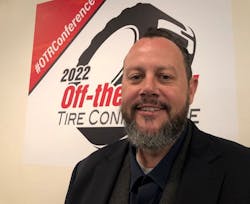Tire Service Careers Can Be Rewarding. But Do Young People Know This?
Remember the term “generation gap?” The Cambridge Dictionary defines it as “a situation in which older and younger people do not understand each other because of their different experiences, opinions, habits and behavior.”
You don’t often hear the words “generation gap” today. But that doesn’t mean generation gaps don’t exist. In fact, the tire industry is suffering from a profound generation gap - especially when it comes to tire service jobs.
Despite low unemployment levels, companies in our industry continue to have a difficult time filling positions. Finding young people who want to work with their hands has been especially challenging.
Some of this is out of our industry’s control. However, there are things we can control. One of them is how we market tire service jobs to the next generation, according to Mason Hess, president of the Tire Industry Association (TIA).
A proud, third-generation “tire guy,” Hess also is the director of Purcell Tire & Rubber Co.’s global mining division. He works with lots of OTR tire technicians, many of whom pull down six figures a year for the services they perform.
Young people can build great careers in the tire industry, Hess told me during TIA’s recent OTR Tire Conference - but only if they know it’s possible.
“The first part is helping them understand that their perception of working in the tire industry is probably wrong,” he said. “When you say, ‘I change tires for a living,’ most people say, ‘I don’t know if I want to do that.’”
Why? Because they see “tire work” as a means to an end - not a potential career with generous compensation and advancement opportunities, Hess told me.
“There are so many people in our industry who started as tire changers. Now they’re running divisions at tire companies or they’re service managers.
“There’s a progression in our business and that’s probably what’s missing the most in our marketing. When young people come in, we should tell them that this is an entry into a career - not just a job.
“If you go into a trade like tire service at the age of 18 and in five years have developed some skills, you will have already outperformed” many college graduates in terms of income.
“One of the silver linings of the current labor shortage is that it’s allowing us - as an industry - to get what we’re worth.”
But pushing that message has to be a priority, says Hess. “We post a job on Indeed and we wait for people to come to us. That’s not really marketing ourselves well. We have to go out and find those superstars.”
During our conversation, Hess referred to the success achieved by many OTR Tire Conference attendees. “We have to tell these stories and make sure young people don’t see working in the tire industry as a short-term option.
“It’s not just, ‘Oh, I’m going to change tires for a little while to pay off a dirt bike or a cell phone.’ It’s a career - and an honorable one, at that.
“I compare our industry to other industries and I’ve found that the tire industry offers one of the fastest progressions for young people
“If you work hard in our industry, you can move up fast. If you’re competent, you can move up fast. There’s so much opportunity to build a great career quickly.
“And our customers are appreciative. That’s another part of it. Our customers are quick to say, ‘Thank you.’ In our business, there’s satisfaction in a job well done. We have to break the stigma of being a ‘tire guy.’”
Retention is the other part of the equation, according to Hess, who added that our industry must be willing to “meet” younger employees “where they are.”
TIA is working on what Hess calls “micro-learning” modules that will supplement its industry-leading training programs.
“An hour-long classroom session won’t hold the attention of people who have a YouTube mindset. Quick, short, repetitive training” is needed.
TIA is looking at developing a smartphone app that will allow technicians to search for - and access - training by topic.
“We’re going to have to feed them what they want. They want technology. They want everything available through their phones. We have to meet that demand.”
At the end of the day, Hess is a realist. He knows our industry will not close the generation gap overnight. But we have to start working on it. There’s never been a better time than today.
If you have any questions or comments, please email me at [email protected]




